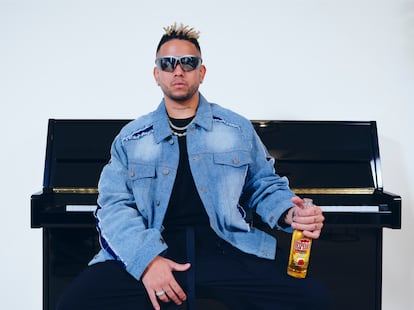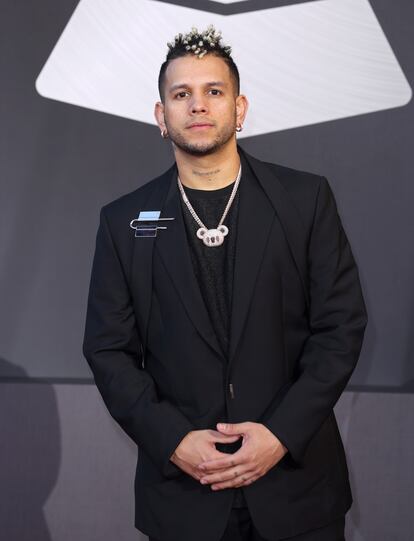
Ovy On The Drums, producer of Bad Bunny and Shakira: ‘I use artificial intelligence even for blood tests’
作者:Raúl Novoa

O-O-Ovy On The Drums. You may have heard that syntagma at some time, most likely at a party or on commercial radio. It is Daniel Echevarría’s tag. He doesn’t usually show his face, but Ovy On The Drums is the music producer behind the biggest reggaeton hits of the last five years. He is the most listened to Latino producer in the world. Karol G’s Provenza and TQG, both of which have accumulated more than one billion plays, are among his biggest hits. With her track Tusa, a hymn to breakups, it was the first time a woman got a number one on Billboard with reggaeton.
Right now, Ovy is in fifth place on Spotify’s global top, and is number one on Billboard with La Plena, his collaboration with Colombian singer Beéle. Accumulating hits is his thing. He has had 200 million plays on Spotify in the space of days. He seems to have hit upon a magic formula for sustained success.
“I don’t like to wait for success. I’m delighted that a track works, but if you wait for it to stick, you put unnecessary pressure on yourself when composing,” he says at an event in Madrid in collaboration with the Desperados beer brand for which he has recorded his new song Guao Guao together with Venezuelan singer Micro TDH.
“You can create a sound in the studio that suddenly, thanks to the internet, sticks and goes global, but there is no formula,” he says.

But being relevant attracts controversy. And he is so big that he has attracted criticism from the president of Colombia for the lyrics of one of his songs, +57, the country’s telephone prefix. It was intended as an ode to Colombian music in collaboration with the best of the country’s urban music stars: Maluma, Karol G, Feid and J Balvin among others. However, Gustavo Petro, the president of the country, disapproved. “In every artistic genre there is art, but also ignorance. Art lasts, ignorance is over in a second,” said the president.
The reason? The line: “mamacita desde los fourteen” — “A hot mama since she was 14.” The Colombian Institute of Family Welfare issued a statement on the matter, pointing out that the song does nothing to help eradicate the sexual exploitation of minors. And its director invited those involved in the song to hear the stories of sexual exploitation and the murder of 14-year-old girls in Medellín. Shortly after its release, in November 2024, the song was modified on platforms such as Spotify and YouTube, replacing the number 14 with 18.
“I feel that they wanted to make trouble and they joined a pretty big collective that wanted to hate on the song. If one actually analyzes the song, mamacita desde los fourteen is not bad, it’s just that since she was a young girl she has been a pretty girl,” Ovy says. “It is explicit, yes, but I think there are worse songs, with frightening messages. I think it’s a little sad what happened, but I still think it’s one of the greatest songs of my career. They criticized it, but everyone sings it.”
And the song gives him food for thought and continues to vindicate the evolution of his genre: “Inciting hatred, violence... I’m not into that. It’s not because it’s my song. I see it as a normal reggaeton song. As artists, we have to be careful what messages we give and we have to criticize certain songs, but reggaeton and its message has been cleaned up a lot.”
The Colombian producer has collaborated with the greats of his genre: Shakira, Bad Bunny, Nicki Minaj, Myke Towers, Becky G, Quevedo, Ozuna, Peso Pluma and J Balvin. Any favorites? “I have a lot of respect for all of them. There’s a mix of legendary artists and others who are in the process of making it. Participating in that process is incredible,” he says. “Every time I work with an artist, I look for where we can meet. La Plena is not the kind of song that Beéle does. We both came together to make a common sound,” he says.
But Ovy On The Drums is not the only producer that has become famous in his own right. Argentina’s Bizarrap, Metro Boomin and Tiny are some other big names. Long gone are the days when producers had to fight to be recognized in the songs or credits. In fact, it seems that we are living the golden age of producers. Now they still sit at the computer, but they are recognized as artists.
“To achieve that you have to build a name, have a good relationship with the singers... It’s difficult. There are artists who start from the beginning and have their producer,” he says. “They already see that it is possible to make a living from it and the new generations are doing it from scratch.”

On the evolution of urban music, Ovy also points out the negatives. “The industry is saturated. It’s not so easy to make something work now,” he says. According to Spotify data, more than 120,000 songs are uploaded to the platform per day.
“I used to feel pressure to constantly upload songs. The important thing is that the product is good. I see how many colleagues release collaborations or albums and go unnoticed. There used to be a worldwide focus. It doesn’t feel the same anymore.”
But Ovy on the Drums has the word perseverance tattooed on his neck. “It is something that has been with me since I was a child and I have it there because in difficult times you have to know how to work, not only in the good times,” he explains.

The use of artificial intelligence in music has also brought controversy. This is mainly because of the possible cuts it could make to the sector’s income. He is not afraid of it; in fact, he rates its possibilities and embraces it: “I use it a lot. It’s a tool that can help you and you have to be active with updates. I use AI even for blood tests. It’s here to stay,” he says.
He knows that, beyond algorithms and automation, there are qualities that cannot be programmed, such as instinct, hearing and sensitivity. When you’re the best at something, there’s not much that can take that from you.
Sign up for our weekly newsletter to get more English-language news coverage from EL PAÍS USA Edition
